5 Simple Steps To Keep Your New Year’s Resolutions as a Writer
It’s January 1, which means it’s time to talk about how to keep your New Year’s resolutions as a writer. New Year’s resolutions are one of the places where writers most often go wrong. We set these huge goals for ourselves, and just like everybody setting New Year’s resolutions, we usually fail to keep them..
We believe the reason we’re not keeping these New Year’s resolutions, the reason that we’re procrastinating, the reason why we’re falling into the same patterns again and again… we believe it’s a lack of willpower.
We believe we’re lazy. We believe maybe we just don’t want it enough.
We believe maybe there’s something wrong with us. We believe that maybe we’re just too scared.
We have all these stories for ourselves about why we’re not changing.
But really, most of the time, the reason that we’re falling short of our New Year’s resolutions, whether it’s as a writer, or for any other resolution, is because we’ve set ourselves up to fail in the way that we’ve made the resolution in the first place.
So we’re going to talk today about 5 simple steps you can take to make resolutions that actually work, that will actually work for you, as a writer.
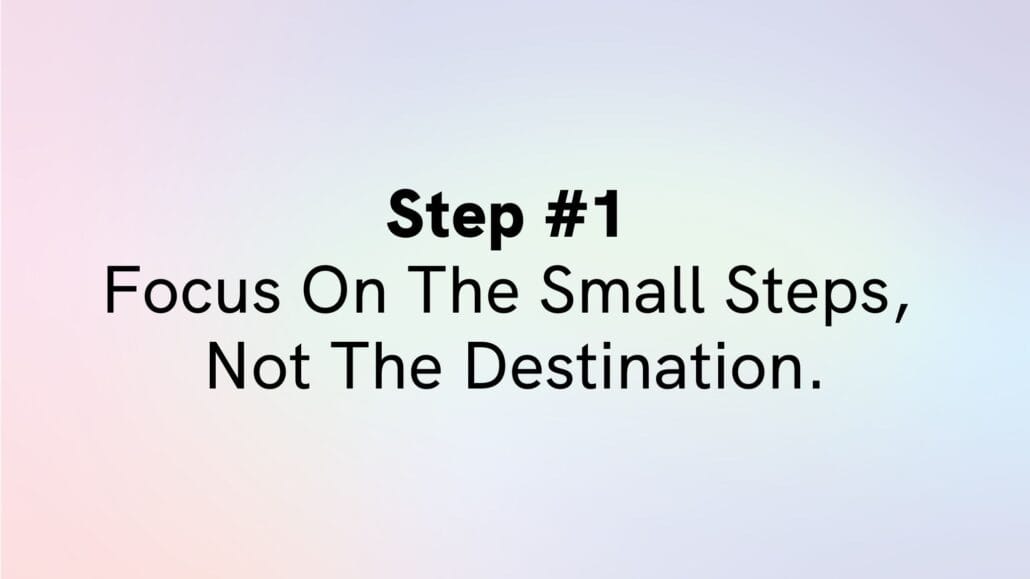
Step #1 For New Year’s Writing Resolutions That Work: Focus On The Small Steps, Not The Destination.
If you actually want to change your life, and you want those changes to last, the most effective way you can do that is often by making small changes frequently.
It is much harder to make a huge change overnight than it is to take a small step overnight.
To be clear, I’m not saying that people can’t make huge changes overnight. People do and can, but it’s usually not the most effective way to get there.
For an example, think about your characters in a script. If you’ve taken my Write Your Screenplay class, if you’ve studied Seven Act Structure, you understand the concept that a movie is just a story of a character who changes. And that as we build that change, we need many steps to get the character there. And one of the big problems with the old three-act structure is that getting a character from A to Z in three steps is not very likely.
It’s not that sometimes people don’t just change like that. But most people don’t.
When most people try to change forever in a moment, what they actually end up doing is just proving to themselves that they can’t change.
And, inadvertently,. they end up reinforcing the very beliefs that get in the way of the change, and that get in the way of their goals.
We know this as screenwriters. We know that if your character is at A and then in the next scene suddenly they’re at Z, that’s not believable. We get feedback like: I didn’t feel the structure of this. I didn’t believe the change. I didn’t believe that the change would stick.
When we build Seven Act Structure: when we build a movie, a limited series, a pilot– we’re actually figuring out the movements by which a character can believably and lastingly change.
So the first mistake in making New Year’s Resolutions as writers is that we tend to think only about the endpoint, rather than thinking about the movements we will need to get there.
And it’s exactly the same problem that most screenwriters make with structure. They think, Oh, I want my character to get to this ending. But they don’t think, Well, what are the actual movements that the character would need to go through?
So the first mistake is we set these giant goals with no path to get there, which only ends up reinforcing our beliefs that we’re not good enough and that we’re not going to make it and that maybe we’re not meant for this.
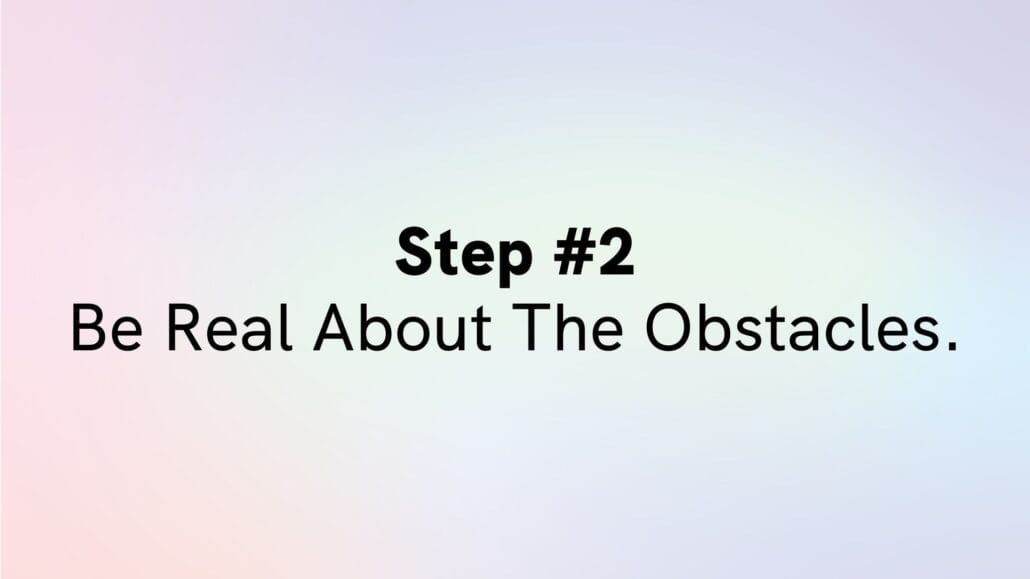
Step #2 For New Year’s Writing Resolutions That Work: Be Real About The Obstacles.
The second mistake we make when we set our New Year’s resolutions for our writing is that we don’t think about the obstacles.
As screenwriters we know that obstacles are primary to structure. When we’re writing a movie or pilot, we know that if a character doesn’t have obstacles, their journey isn’t going to be believable.
But we also know that if the character doesn’t have obstacles, they’re not actually going to change!
The obstacle is what reveals to the character the parts of themselves that they didn’t know existed.
Obstacles are vital for change.
Yet, when we make our New Year’s Resolutions, we often pretend that the obstacles that have gotten in the way of our writing for all of 2023 are somehow going to just disappear in 2024– that somehow those obstacles aren’t going to be there.
“Oh, I’m not going to get sucked into Facebook in 2024. I’m not going to devote my time to my needy family members in 2024. I’m not going to spend so much time with my partner in 2024. I’m not going to be scared in 2024. I’m not going to procrastinate in 2024. And my boss isn’t going to give me huge amounts of work that I’m not expecting in 2024.”
We start to imagine that our lives are going to be completely different. And those beliefs are often not connected to our reality.
In fact, we’re reenacting that first mistake – setting a giant goal without thinking about the steps to get there.
We pretend that the obstacles are going to go away in the New Year. And then the obstacles don’t go away.
At least not overnight.
It is actually true that we can overcome obstacles. It is true that we can surmount obstacles.
But it takes time to do that.
We have to start to carve out the space for this new change in our lives. We have to carve out that room because most of us already live overwhelming lives.
And it’s not because we don’t have time. All of us kill time. All of us have a social media problem. All of us have a phone problem. Everybody in the world gets sucked into working on easy tasks that seem important and urgent but aren’t really connected to our greater goals.
All of us get distracted. All of us need pleasure. And sometimes we allow our desire for pleasure to take us away from the things that matter.
All of us have fear.
And we are all overwhelmed.
So pretending that the overwhelm is going to just disappear in the New Year just sets you up for failure.
Instead, what you really want to ask is:
“How am I going to carve out a little bit of space in my overwhelming world?”
“What small choices am I going to make to open up a little bit here, and then a little bit more, and then a little bit more? How am I going to slowly– in a sustainable, realistic way– change the given circumstances of my life?”
You can’t change the fact that the world is always going to be throwing more at you than you can handle, but how do you slowly start to put your focus on the thing that really matters to you, rather than all the supposedly urgent things that grab your attention but are not connected to your main goal?
So, number one, think about the steps to get there, not just the destination. And number two, be realistic and honest about the obstacles. We want to imagine the worst-case scenario for 2024 and then ask, “What are the new choices I’m going to need against these obstacles to be able to actually carve out space.”
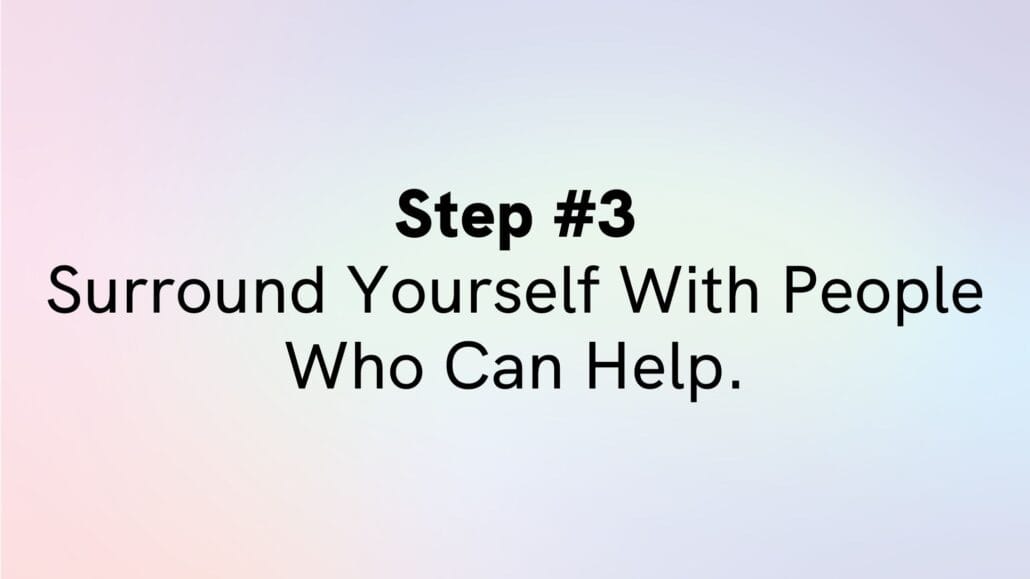
Step #3 For New Year’s Writing Resolutions That Work: Surround Yourself With People Who Can Help.
The third thing that we need to ask ourselves is what kind of help are we going to need?
Nobody does this alone.
We need support to change.
And sometimes change requires changing who we are spending time with.
Are you spending time with people who drag you down, people who distract you, people who are primarily needy, people who ask for more than they give, people who knock down your self-esteem, people who don’t believe in your dream?
Or are you seeking out people who will support your dream, who are going to cheer you on, who are going to push you, who are going to challenge you, who are going to inspire you towards your goal?
Sometimes, if we really want to change, we have to make some hard choices about the people we’re inviting into our world, so that we can invite the people into our world that really support the kinds of changes we’re making.
If you’re a screenwriter looking for this kind of community, a great place to start is our Thursday Night Writes. You can start for free every Thursday, 4:00 Pacific/7:00 Eastern. It’s free, it’s an hour, there are 100 people every week in the room. All passionate writers like you. You can start right there, hang out in the breakout rooms, and find your community.
Who are the relationships in your life that support your greater goals, that support your resolutions? And who are the ones who are getting in the way? Who are the crazymakers in your life? If right now they take two hours a week, how can you cut them back to one hour a week? 30 minutes a week? 10 minutes a week? No minutes?
What kinds of choices are you willing to make to surround yourself with the people who push and inspire you towards your goal? And what are you going to give back to those people? How are you going to help inspire them?
We all need community to get to where we’re going.
So number one, we’re going to focus on the steps rather than the destination. We’re going to focus on nice, small, manageable, meaningful steps. We’re going to focus on things we can do right now, rather than the huge changes that are so hard to hold on to.
Number two, we are going to be real about the obstacles. We’re going to start to make real strong, manageable, sustainable choices against those obstacles, not choices that are going to work for one week.
“For one week, I’m telling my boss fuck you.” No, that doesn’t do anything.
But something like this will:
“For the rest of my life, I’m taking a half hour for lunch where I write.”
“For the rest of my life, I’m going to wake up 10 minutes earlier so I can just start my day with 10 minutes of writing.”
How do you make small meaningful changes upon which you can build, rather than huge unsustainable changes that you’re just not going to be able to hold on to? How will next year be different?
How will you support yourself? How will you find help? How will you find community? How will you start to orient myself towards the people who feed your dreams and away from the people who distract you and push you away from the things that really matter to you?
How do you start to reduce the time that you’re spending with those people and make room for the people that you need to enter my life?
You’re going to need help to do this. So build the community you need to help you.
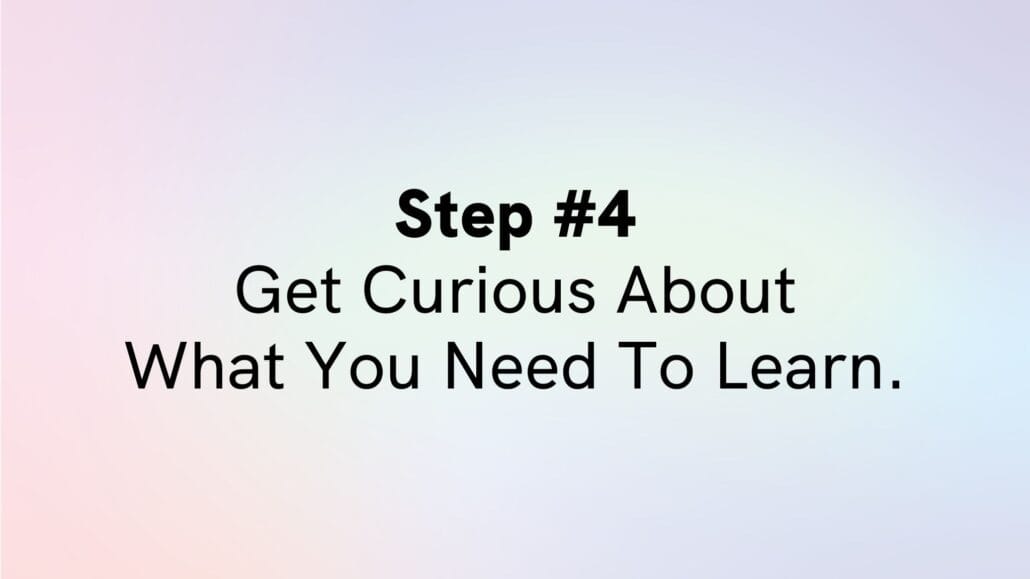
Step #4 For New Year’s Writing Resolutions That Work: Get Curious About What You Need To Learn.
So many screenwriters think they can solve their procrastination problems like this:
“I’m just gonna write for two hours a day, every day.”
And that’s sustainable– for a couple of days.
And then they start to bump up against not actually knowing what to do. Not actually knowing what to write and how to write it.
We writers can be so cruel to ourselves. We’re artists, and we feel like we should already know what to do. Like this is some kind of innate gift.
And it is an innate gift. You have an innate gift. And it’s important to build on that and to recognize that.
But there’s also a craft to writing.
And one of the reasons that writers tend to flame out, if they’re writing without guidance, is they can bump up against the things they don’t know yet.
Let’s imagine this situation in any other scenario:
“I really desperately want to build a microscope, but I don’t know anything about microscopes. I know there’s some lenses and I’m gonna spend 10 hours a day ‘til I figure out a microscope.”
Well, the chances are, if that’s your approach, you’re not going to figure out a microscope. Not unless you learn how microscopes work.
“Let’s figure out how they’re built. Let’s look at some of the mistakes other people have made. Let’s look at the greatest microscopes that are already out there. Let’s figure out what’s missing in the microscope world. Let’s get curious about how to build a different kind of microscope.”
These are the thoughts that are going to support your innate talent.
We need more than just time and determination to succeed in our dreams. We need education as well.
So I want you to ask yourself:
“Where am I strong? What do I already know? What do I already do well?”
And then you can double down on those strengths.
But I also want to ask you to ask yourself some different questions:
“Where am I weak? What education do I need to achieve my goals so that I don’t flame out just bumping against the edge of what my knowledge is.”
Whether that’s knowing what to write or how to rewrite or how to build structure. Ask yourself what education you need? And how are you going to get that education? How are you going to make room for that kind of support, so that as the time you spend on your writing expands, you are also expanding the skills that support that kind of writing.
So four incredibly simple things that will absolutely change your life and help you hold on to your resolutions.
#1- You’re going to focus on the small steps, not the destination.
What are the small steps? You might want to break your resolution down into weekly goals. If you’ve taken my Write Your Screenplay class, you know that these goals can be as small as seven minutes.

If you write for seven minutes, three times a week, you’ll probably finish a script by the end of the year.
And you’ll also start to learn that those little seven-minute blocks start to expand. Once you get really comfortable writing for seven minutes, three days a week, it gets easier to write for 10 minutes, three days a week. To realize, “Oh, I have another seven minute block here on the fourth day. Oh, I have another seven minute block here as well.”
And now you’re writing four or five days a week for seven minutes. And then pretty soon, you’re writing four or five days a week for 10 minutes, and then 15 minutes, and pretty soon you’re doing an hour and then suddenly, you’re doing two hours.
Because instead of trying to go immediately to running the marathon, you’re actually allowing yourself to do some training to get yourself in shape, to get some experience, to build up some stamina, to get your writing energy going, to get your muscles strong, to get your tools sharp.
Building that regular rhythm trains you and it trains you in such an effortless, easy way.
#2- Be real about your obstacles.
Are you really going to wake up early? If you’re not, don’t schedule it early. Are you really going to write late at night? Or will you be too tired? If you are, you might have to carve out the time in a different place.
I want you to get so real about your obstacles. And get real not about who you wish you were but who you actually are today. If you keep taking steps, a year from now you will be a different person than you are today– but be honest that you are not that person yet.
Hey, I have all kinds of internal obstacles. If I didn’t, I wouldn’t need to set a resolution. I would already be there. It’s cool. I have a procrastination problem. I have a Facebook problem. There are things that I do that distract me. Hey, I’m not a morning person. Hey, I’m not a night person…
By being realistic about the obstacles that exist, we can get more realistic about solving them.
#3- You need a community– a community that rocks, a community that inspires you. You need a community that bolsters you. You need a community that both pushes you and helps you see your talent.
You cannot do it alone. Nobody can do it alone. I can’t do it alone. None of the writers you admire can do it alone. We all are dependent on our community.
So making those hard decisions in order to build the community you want, you’re going to need to make some space and time. You’re going to need to cut some people out. Some people might need to be cut out entirely. Some people might need to be cut down a little bit in order to make room for those people who support you.
#4- Get curious about what you need to learn. And get serious about your education as a writer.
Of course, we have lots of programs that can support you. And there are also things you can do on your own. Are you breaking down movies? Are you reading scripts? Are you watching shows and movies?
Set some goals: How many episodes are you going to watch this week? And how are you going to do it differently so you can most benefit? How are you going to break it down? How are you going to start to learn that structural stuff? What kind of support do you need? What kind of feedback do you need? What kind of information do you need? Where are you going to get it from?
And you have to be careful who you get your information from, because there are a lot of sharks circling these waters– people who have never sold a screenplay but have written a screenwriting book, who have never sold a screenplay but are teaching screenwriting.
So you have to do your research and make sure you’re learning from real people. Because if you don’t, you’re going to flame out in the same way they’re flaming out.
You need real mentorship.
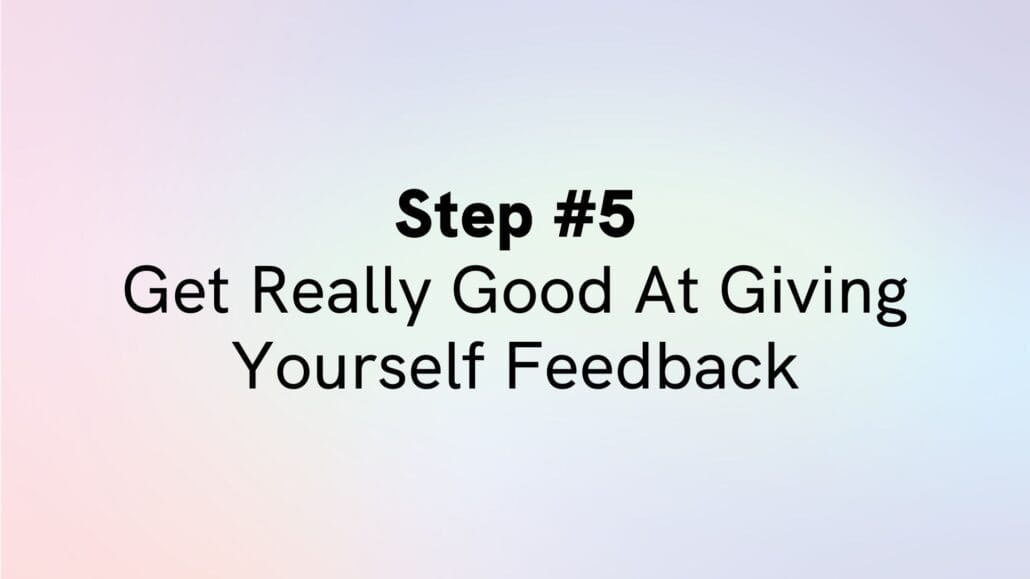
Step #5 For New Year’s Writing Resolutions That Work: Get Really Good At Giving Yourself Feedback
Most likely, you are the biggest obstacle to your own change. The negative talk that you give yourself is the biggest obstacle to your desire to change.
And changing that negative feedback loop is one of the greatest challenges, because we all have these voices in our heads that tell us we’re not good enough. We all have these voices in our heads that tear us down.
And these voices, they come with good intentions. I call these voices the Inner Censor. They have good intentions but they wind up censoring our voice.
And this creates procrastination and writer’s block and all the things that get in the way of these beautiful goals that you have.
We think that if we’re really tough on ourselves that magically we’re going to turn into awesome writers.
“Oh, this line sucks. Oh, this sucks. What a bad scene. Oh, this is no good. Oh, the character doesn’t want anything. Oh, the image isn’t good. Oh, this is cliche.”
And I wish that were true. But it is not.
Exactly the opposite is true. If you want to turn somebody into an awesome writer, you have to keep them motivated to write. Being told, by our Inner Censor or by anybody else, all the ways we suck does not motivate most people.
It actually creates a cortisol response, which suppresses our motivation. when really we want a dopamine response, which increases our motivation.
(Yes, this is a little bit of an oversimplification for you neuroscientists out there, but it’s good enough for our purposes.)
As writers, we want to be in the dopamine business.
In other words, we want to write and then we want to get a hit of dopamine that makes us feel like we want to write again!
We want to feel successful, because every time we feel successful, we have a desire to keep stepping towards our goal.
And you can see how this connects to the first step. If we set these huge goals, which most of the time we’re falling short of, we’re getting cortisol instead of dopamine. So we have to fight through that inertia to want to write again.
To succeed in keeping your New Year’s Resolutions as a writer, you have to get really good at giving yourself positive feedback. And that doesn’t mean giving yourself bullshit feedback.
Positive feedback is not bullshit feedback. You know when you’re bullshitting yourself and you know when somebody’s bullshitting you.
Learning how to give great, real feedback can start with giving yourself supportive feedback just for pursuing your goals, regardless of the quality of your script .
“Hey, I wrote for seven minutes. That’s actually more bravery than most people have shown in a lifetime! I kept my schedule. I did what I said I was going to do. I said I was going to write from 10 to 10:07 am on Tuesdays, Thursdays and Fridays, and I did that. I did it Tuesday, I did it Thursday, I did it Friday.”
You can’t control the quality of your writing, but you can control the action of writing. And giving yourself some positive feedback will change your life.
Remember that just to do those seven minutes took tremendous bravery, took stepping into the unknown, took confronting all your fears, took carving out those seven minutes from all the other overwhelming things.
You can start by just rewarding yourself and praising yourself for actually doing what you set out to do, which means that, just like a character in a script, you have to get good at goal-setting so that you know when you’ve achieved your goals.
So getting really good at giving yourself feedback begins with getting really good at setting your goals.
Getting good at setting your goals means setting goals that you can control.
On the surface, this might sound like good goal you can control:
“I’m going to write one good page.”
But it’s not. If you’re a writer, you know some days you can write one good page in three minutes, and it is magic. And some days, you can spend 14 hours writing and still feel like you didn’t write a single “good” page.
You could spend three days nonstop writing and get zero “good pages.”
We don’t have any control over good.
But we have control over time. How many minutes, how many hours we write. And we have control over page count.
We have control over craft.
We can set craft goals like this:
“Hey, I don’t need to make it good, but I can make sure that dad and mom’s characters talk differently.”
“I don’t need to make a good, but I need to make sure that the character wants something in every scene.”
“I don’t need to make it good. But I need to make sure that I’m writing images I haven’t seen before.”
We can start to set really good goals for ourselves. Goals that are independent of judgment.
To make sure that we’re setting goals for our New Year’s Writing Resolutions that we can actually accomplish, we want to set objective not subjective goals. We want to be able to say, “Yes, I did it” or “No, I didn’t do it.”
What’s a subjective goal?
Say we invite 10 people into a room. Ten people are going to have 10 different opinions. If you ask them if the scene is funny, three people are going to say, “Oh, yeah, it was really funny.” And then somebody else is going to say, “I don’t think it was funny.” And somebody else is going to say, “I actually think it’s a drama.” And somebody else is going to say, “I kind of smirked, but I didn’t laugh.” While somebody else is telling you, “I was rolling on the floor.”
And you still don’t know if it’s funny.
You know this is true because you’ve hated movies that have gotten the greatest reviews. You’ve loved movies that your friends hated. Those are subjective evaluations.
Subjective evaluations are valueless for artists.
An objective evaluation is more like this:
“Does this character want something? Yes or no? Can I name it? Yes or no? Can other people name it? Yes or no? Did I write a page? Yes or no? Did I rewrite a page? Yes or no?”
If ten people from completely different backgrounds were all in the room, and they would all agree with your yes or no, you have an objective goal.
That’s the kind of goal you want to set.
So, your first step in learning to give yourself feedback is to get really clear on your goal setting– set small goals that you can actually achieve that day– ideally in seven minutes.
Make the goal so small that you can’t help but do it. If you just sit down for seven minutes, you can do it.
And then praise yourself. “Yes, I did it!”
Or, “No, I didn’t, I have to keep working.”
Setting goals and achieving goals, and giving yourself the acknowledgment of “Yes, I did it,” releases dopamine into your system, which makes you want to write again the next day. It makes it that much easier the next day to do all the work of the first four steps.
So we have to get good at setting goals.
Just like our characters are not going to have structure if they don’t have goals, we’re not going to have structure if we don’t have goals.
So we have to get good at setting goals and get good at giving ourselves feedback on those goals.
That’s the easy part of giving good feedback. The next piece is harder. It’s about actually learning to see the beauty in your writing.
And that’s so hard.
When you’re given a magical writing day, when the muse is there for you, it’s easy to find the beauty in your writing… sometimes.
But if you’ve ever done the “bad screenplay exercise” with me in one of my classes, you know that every time, there’s someone who thinks they wrote the worst script ever, and that script is always freaking brilliant.
As a new writer, the chances are good that you’re actually going to throw out your best material. You’re actually going to judge, negatively, your best material, because you probably don’t have the experience yet to know what works.
You can see how this connects to getting the education you need and getting the community you need.
We’re terrible evaluators of our own writing, especially right after we’ve written it, because we’re filled with all these feelings.
Sometimes it’s just the process of writing that brings up negative feelings.
We’re looking at something that makes us feel sad or dark or uncomfortable. We’re dealing with our repressed truths. And when we get that stuff on the page, we sometimes are very triggered. So we might have a really negative feeling about a really great scene until we let it go for a couple of days and come back to it a few days later.
Similarly, our best writing is the writing that’s different from everybody else’s writing. That is, the writing that’s most likely to make us uncomfortable!
It’s another reason why the writing that we’re most likely to judge is actually our best writing.
On the other hand, our most cliche writing often feels like the stuff that we’re reading other people doing, it feels like other people’s writing, it feels safer. We’re not so naked on the page.
So most beginning writers will actually identify their worst stuff as “good” and their best stuff as “bad.”
As if that didn’t make evaluating our work complicated enough, there’s a whole other layer to it:
The best stuff we’ve written might not be good yet!
If you’re a gold miner, you’re looking for something very different than the gold that we look for at a jewelry shop. In fact, if you’re looking for gold that looks like gold, you’re probably going to find Fool’s Gold, not real gold.
It takes a certain amount of expertise to identify gold when it is in a hunk of rock, with all this schmutz around it, and it doesn’t look like gold yet.
We have to develop the expertise to look at an early draft, and see “That’s where the gold is.” Even though it needs polishing and shaping, even though it needs development, we need to learn to see that there’s gold in there.
We have to develop these skills in evaluating our writing so that we can actually understand that what looks like crap in Draft #1 is going to be gold in Draft #15.
If you have trouble recognizing the “gold” in your writing, an easy place to start is by looking for things that feel true, or things that create strong emotions in you.
Even if those are negative emotions, even if you hate it, or it makes you uncomfortable, or it’s so different from anything you’ve seen before you don’t know if it’s working yet, those are the easy places to start looking and start giving yourself feedback.
Those are the things that are likely to become good.
So we need to develop our vision and our skills so that we can actually recognize, “That works, that can be built on, that can be shaped, that feels true. Even though that doesn’t make sense yet, I know that can be beautiful.”
Of course, we also need to learn how to deal with the things that aren’t working, how to be tough with ourselves, how to push ourselves to be better. We need to learn those things.
But first, we need to learn how to give ourselves feedback on the things that do work. Then we can be motivated to keep going and keep achieving our New Year’s Resolutions and all of our other goals.
We need to learn how to give ourselves– not bullshit feedback– but real feedback. Not bullshit support, but real support.
We need to learn to see the real beauty. We need to push ourselves to look closer.
You’re going to have an urge to start by listing all the things that don’t work when you read your own writing. And you can do that… but not yet,
I want you to first make a list of every single thing that works.
Then, when you get around to listing the things that don’t work, you can only list as many as the number of things that do work.
You have to list the things that work first. If you have six things that work and you want to write seven things that don’t work, you have to go back and find one more thing that works.
This will give you a foundation to build on before you start tearing yourself down. It’s going to train you to start to see what you’re building before you start to see the things that suck. Because there are always going to be millions of things that suck… until you get to the final draft.
And even then there are going to be things that suck that only you know, that nobody else recognizes.
We need to know what we’re building in order to know how to bring our critical mind to it.
And we need to know that we’re successful in order to have the confidence to keep persevering under the force of our criticism, and of course, the force of other people’s criticism.
If you do these five things, you will find that achieving your resolutions becomes not only easier, but actually joyful.
And along the way, you’ll learn that these processes by which you are keeping your resolutions are the same processes by which you’re going to learn structure for your characters. You’re actually going to learn to build your script by building movement in relation to a theme.
In other words, you’re giving your character a resolution.
But when you start to break down the steps of their journey and the real obstacles and the mistakes and to push them towards their beauty, even against their worst mistakes– when you do that, you will start to learn how to build structure for your character.
The same skills with which you build structure for your characters allow you to build structure for your life.
A New Year’s Resolution is just a dream towards structure.
But the dream towards structure is not what changes you. What changes you are the small steps you take on a frequent basis– those small, easy steps. A step today, a step tomorrow. Another step, another step.
Those simple repeated steps are actually the only thing that can take you on the journey of change in 2024 that you really want for yourself.
So Happy New Year, have a wonderful 2024. I’ll see you at Thursday Night Writes or any of our other wonderful classes or our ProTrack mentorship program in the New Year.

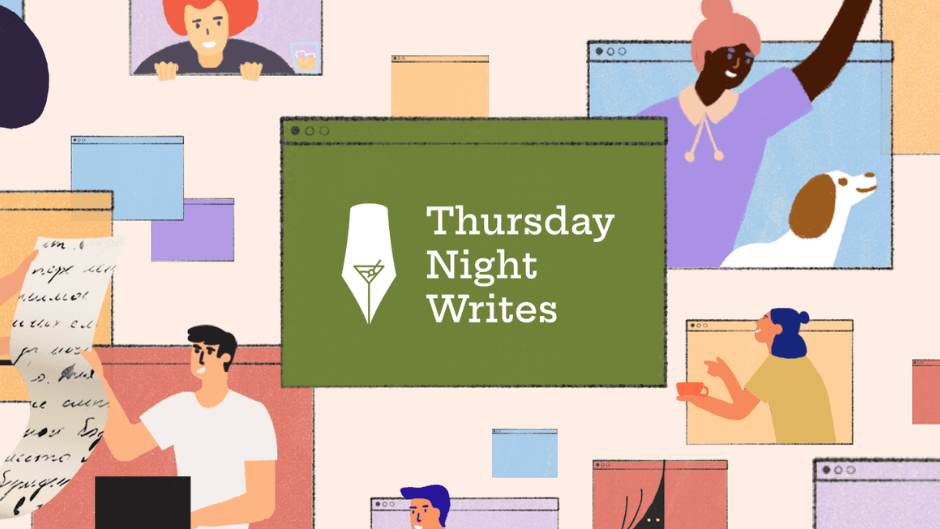
I hope that you enjoyed this podcast. If you are getting a lot out of it and it’s helping your writing, come and study with us. We have a free online class every Thursday night, foundation classes in screenwriting and TV writing, a Master Class for those of you who want a grad school education at the tiniest fraction of the cost, and a a wonderful ProTrack mentorship program that will pair you one on one with a professional writer, who will read every page you write and mentor you through your entire career at less than you would pay for a single semester of grad school.




